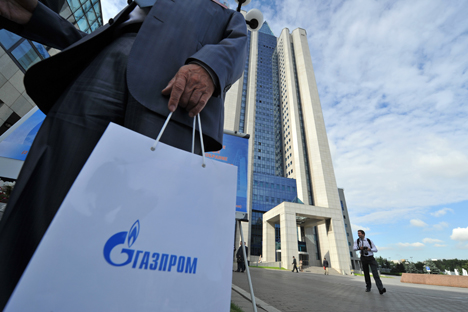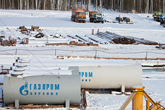Gazprom becomes more flexible

Gazprom has unexpectedly announced possible continuation of transit through Ukraine. Source: RIA Novosti
The Russian gas monopoly Gazprom will hold an auction in September 2015 to supply three billion cubic metres of gas to Europe, Russian business newspaper Kommersant reported. The paper quoted Gazprom CEO Alexey Miller, who said there would be a spot bid auction, for the supply of gas "here and now," instead of the traditional take-or-pay method used by Russian companies; where the buyer agrees to buy a certain amount of gas in the long term and, in case of the volume is less than agreed, pays the fine.
Against this background, Gazprom has unexpectedly announced possible continuation of transit through Ukraine. Earlier, to abandon this route, Gazprom announced the Turkish Stream; the gas pipeline project that would bring gas under the Black Sea from Russia to Turkey and further into countries of southern Europe.
The new plan
“Gazprom selling 3 billion cubic meters of
gas on the spot market can be seen as a trial balloon," said Ivan
Kapitonov, Deputy Head of the Department of State Regulation of the
Economy at Moscow's Presidential Academy of National Economy and Public
Administration
However, if such a plan were successful, it would not only allow Gazprom to
sell additional volumes, but also give it a stronger negotiating position on
the Turkish stream: that project is still under negotiation. This way, Gazprom
signalled that it was considering alternatives to increase gas supply to Europe, said Kapitonov.
According to Ilya Balakirev, senior analyst at UFS IC, Gazprom sells small volumes of gas on the spot market once in a while, but the Russian monopoly is unlikely to abandon the take-or-pay scheme. "This condition results from the fact that the pipeline deliveries have actual fixed transportation costs, and if the actual supply volumes become significantly reduced, the company will incur losses," said Balakirev. According to him, Gazprom might abandon the take-or-pay scheme only if the technology of gas transportation changes. Such schemes can not be used for tanker shipments of liquefied natural gas.
Transit through Ukraine
Russian President Vladimir Putin also urged them to negotiate the extension of gas transit through Ukraine after 2019, said Miller, the head of Gazprom. Earlier, Gazprom had promised to end the supply of gas through Ukraine in 2019, once the current transit contract expires. In April 2014, Miller had said that due to the construction of the Turkish Stream pipeline in 2019, they would completely stop the transit of gas through Ukraine.
According to Kapitonov, the presidential suggestion to negotiate the extension of transit through Ukraine after 2019 could be for several reasons. First, to increase pressure on others involved in the Turkish Stream, and second, possible rapprochement with the Ukrainians.
"The unconditional renunciation of Ukrainian transit was not a constructive position," said Mikhail Korchemkin, General Director of East European Gas Analysis.
According to Balakirev, "perhaps, potential Turkish stream partners became too intractable, and this is a signal for them." However, since the “first string of the Turkish stream is intended only for the Turkish market, it would be completed in any case.”
At the St. Petersburg International Economic Forum in June, Gazprom decided to double the capacity of the Nord Stream pipeline. Gazprom, signed a memorandum of intent with the Anglo-Dutch Shell, the German E.On and the Austrian OMV to build two gas streams from Russia to Germany under the Baltic Sea, with a total capacity of 55 billion cubic metres.
All rights reserved by Rossiyskaya Gazeta.
Subscribe
to our newsletter!
Get the week's best stories straight to your inbox

